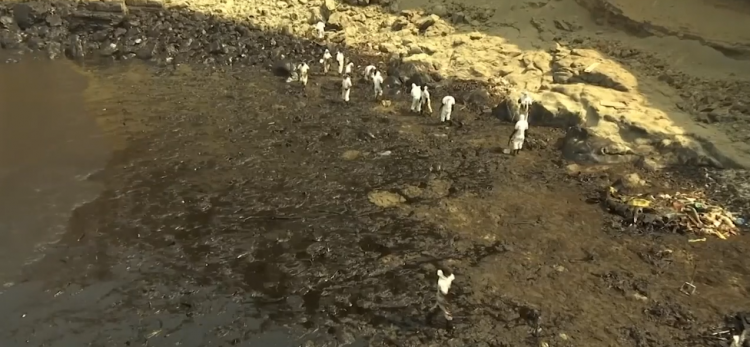A Lima zoo is racing against the clock to save scores of seabirds, including protected penguins, that have been smeared in oil after 6,000 barrels of crude spilled off Peru's coast in the aftermath of the Tonga tsunami.
Peru has declared an environmental emergency following the spillage of nearly a million liters (264,000 gallons) of crude into the sea last Saturday when a tanker was smashed by large waves while offloading at a refinery.
After being rescued from polluted beaches and nature reserves, more than 40 birds were taken to the Parque de Las Leyendas zoo, including Humboldt penguins, which are classified as fragile by the International Union for Conservation of Nature.
According to the Ministry of Health, sea currents dispersed the oil down the coast, which the public is advised not to visit since they are designated as "unhealthy."
The birds are being cared for by a team of veterinarians who are bathing them in special detergents to remove the stifling oil.
Antifungal and antibacterial medicines, as well as vitamins, were administered to the animals.
The accident near Lima has contaminated beaches and hurt the fishing and tourism businesses, and cleanup personnel have been working around the clock to clean up the mess. The extremely enormous waves were caused by the eruption of an undersea volcano thousands of miles distant, near the archipelago of Tonga.
More animals will perish if the oil spreads, according to Guillermo Ramos of Peru's Serfor forestry service.
"There are species here that feed on crustaceans and fish that are already contaminated," he said.
Since the spill, Serfor personnel have discovered numerous dead birds and sea otters on beaches and in nature reserves, he noted.
In Peru, more than 150 bird species rely on the sea for sustenance and reproduction.
A variety of cormorants and six Humboldt penguins were among the birds retrieved alive but in need of assistance.
According to Juan Carlos Riveros, scientific director of the Peruvian rescue organization Oceana Peru, the oil could disrupt the reproductive ability of some species and cause birth deformities, particularly in birds, fish, and turtles.
The health ministry announced that sea currents have pushed the spilled oil down the coast more than 40 kilometers (25 miles) from the refinery, affecting 21 beaches and warning would-be bathers to stay away.
The government has filed a claim against Repsol, the Spanish oil corporation that owns the tanker.
However, the company disputes culpability, claiming that no notice of anomalous waves was sent by marine authorities following the Tonga eruption.






